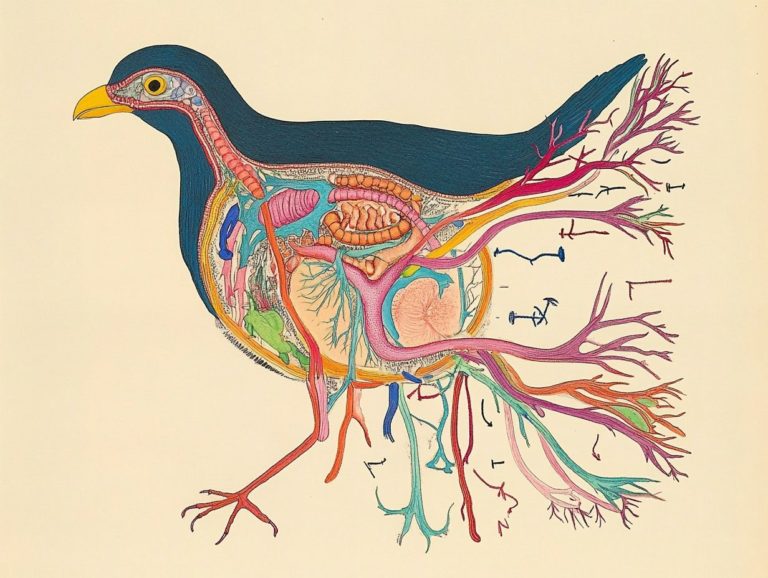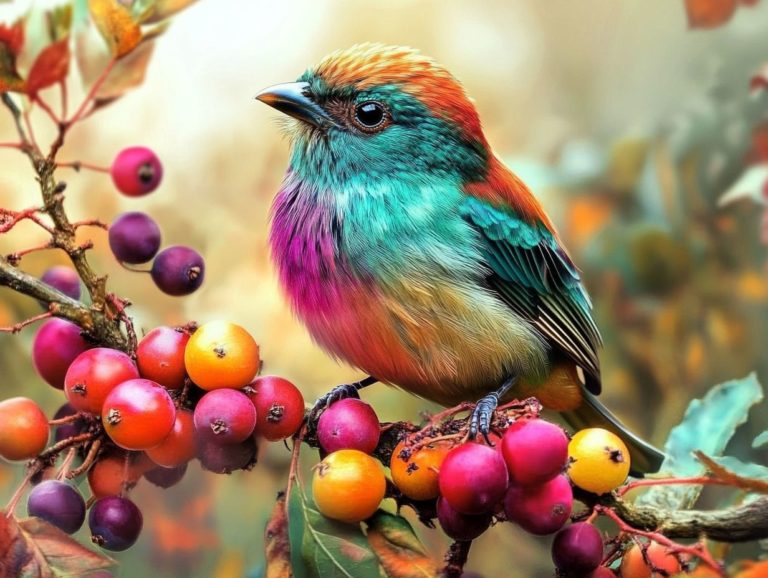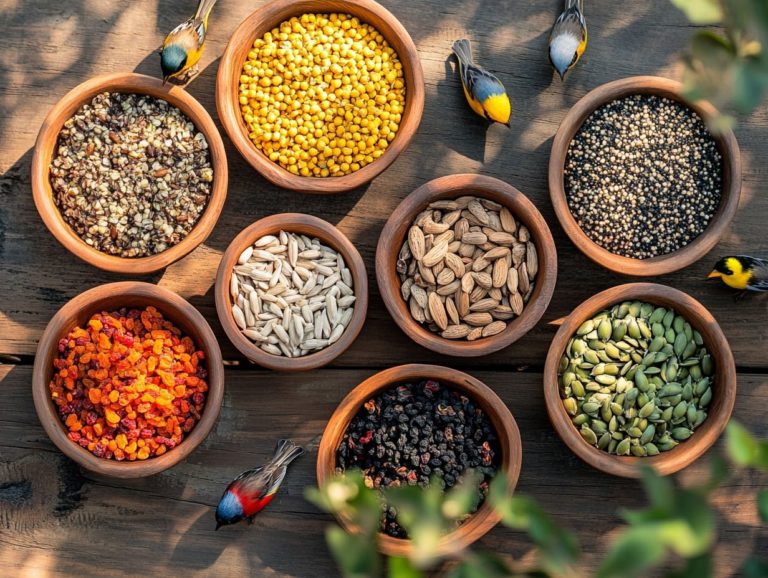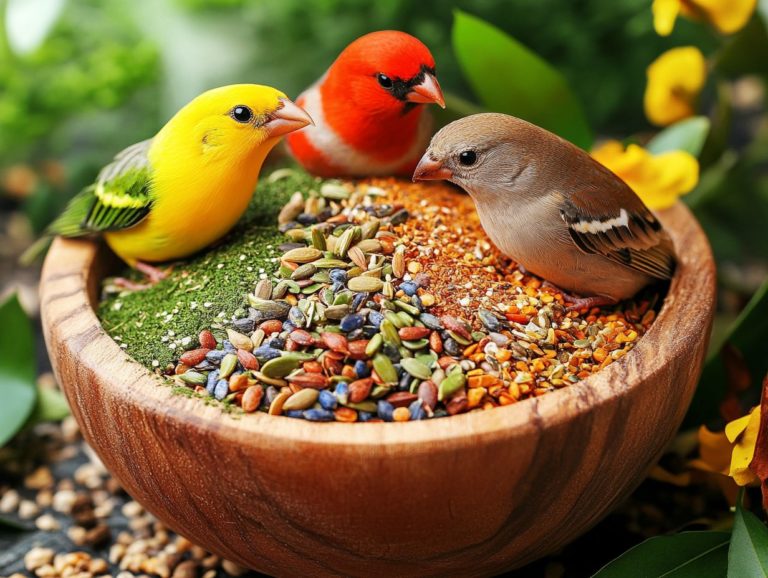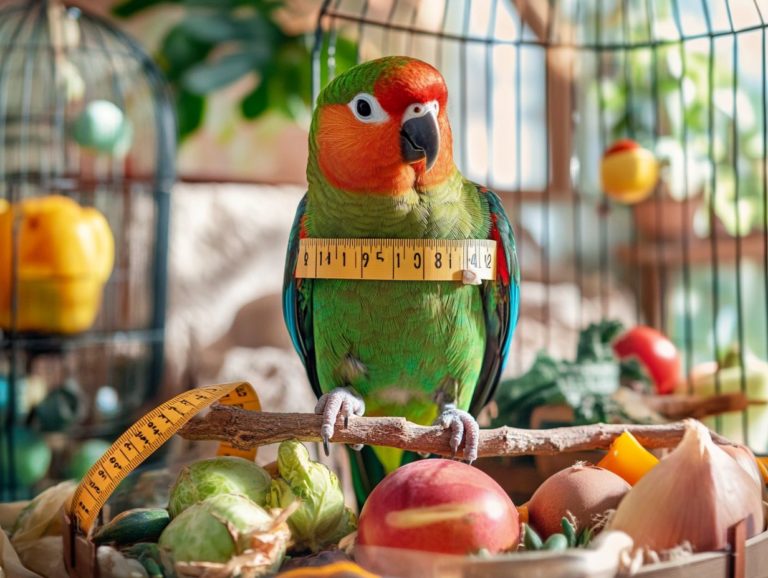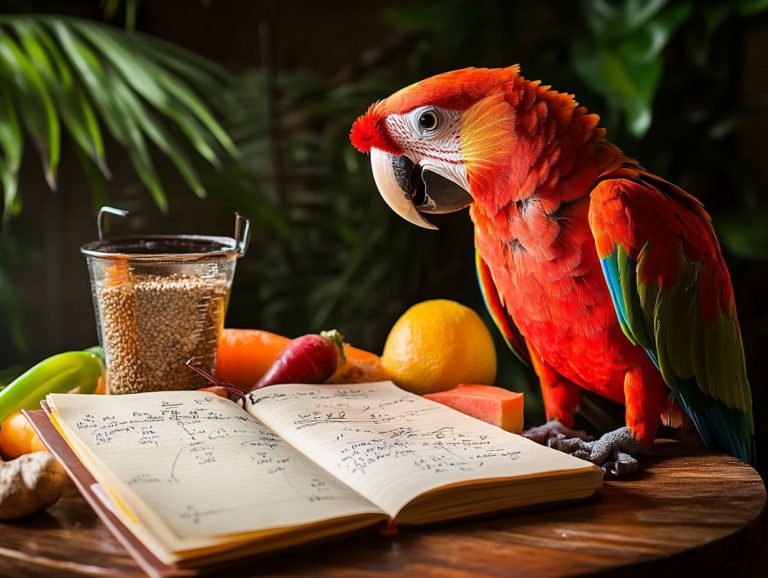The Best Time to Feed Your Pet Bird
Understanding your pet bird’s natural rhythms is essential for ensuring their health and happiness. Just like humans, birds flourish on routine. Their feeding patterns significantly impact their well-being, including daily habits around mealtimes and access to fresh food, such as fruits, vegetables, and nuts.
This article delves into the importance of feeding frequency tailored to different bird types, including parrots, cockatoos, and macaws. We ll discuss ideal feeding times throughout the day and special considerations for older or ailing birds, especially regarding their nutrition.
You ll also discover tips for establishing a consistent feeding schedule, including portion control. Learn to recognize signs that your feathered companion may need more or less food, such as changes in weight or behavior.
Immerse yourself in this knowledge! This information can be particularly beneficial for those caring for a variety of birds, whether through breeding or as dedicated pet owners.
Contents
- Key Takeaways:
- Understanding Your Pet Bird’s Natural Rhythms
- Feeding Frequency for Different Types of Birds
- Recommended Feeding Times for Pet Birds
- Special Considerations for Sick or Elderly Birds
- Creating a Feeding Routine for Your Pet Bird
- Signs that Your Pet Bird May Need More or Less Food
- Frequently Asked Questions
Key Takeaways:
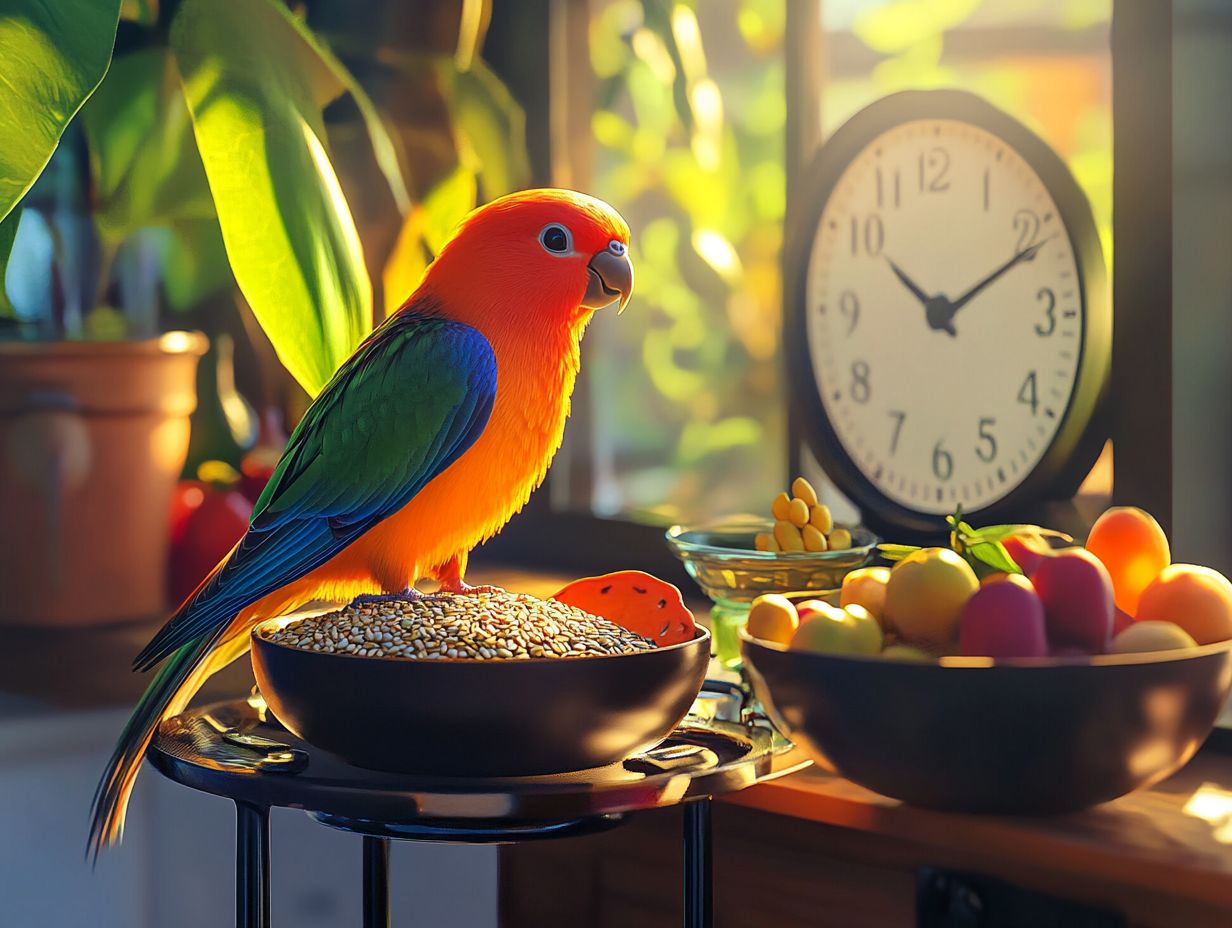
- Understanding your pet bird’s natural rhythms is crucial for knowing the best time to feed them. Ensure they have access to clean water and a balanced diet.
- Factors such as species, age, health, and daily activity levels can affect how often you should feed your bird.
- Establishing a consistent feeding routine and monitoring your bird’s behavior and weight are key in maintaining their health and well-being.
Understanding Your Pet Bird’s Natural Rhythms
Understanding your pet bird’s natural rhythms is crucial for providing optimal care, especially for parrots, cockatoos, and macaws. Each species may have different dietary needs regarding seeds, pellets, and fresh fruits. These bird friends flourish on routines that mirror their natural behaviors, affecting their diet, health, and overall well-being.
By paying attention to daily patterns, like mealtimes and activity periods, you can ensure your birds receive the appropriate nutrition and mental stimulation they need. This insight not only elevates the quality of life for your feathered friends but also enhances your care practices. It allows for better management of their health and nutrition.
Creating a well-structured environment that honors their natural inclinations can profoundly impact their health and happiness.
Daily Patterns and Needs
Understanding the daily patterns and needs of parrots is crucial for their overall health and happiness. This influences aspects from mealtimes to exercise routines.
By establishing a consistent schedule, you create an environment where these vibrant creatures can truly thrive. Parrots respond positively to regular feeding times. This ensures they receive a balanced diet rich in important nutrients.
For instance, offering a variety of fruits, vegetables, and high-quality pellets in the morning can significantly boost their energy levels. This makes them more eager to engage in playtime later on. This interaction not only supports their physical well-being but also stimulates their mental activity, effectively preventing boredom and undesirable behaviors.
Regular rest periods are important, allowing your parrots to recharge and maintain emotional stability. This is essential for training and bonding with your pet.
Feeding Frequency for Different Types of Birds
Feeding frequency varies significantly among different types of birds, including parrots, cockatoos, and macaws. Understanding their specific dietary needs can aid in selecting the right mix of seeds, fruits, and vegetables. These nuances are essential for ensuring their health and meeting their specific nutritional needs.
By tailoring their diets according to their unique requirements, including a balance of fresh fruits, veggies, and quality pellets, you can provide the best care possible.
Start monitoring your bird s behavior today to ensure they are healthy!
Factors that Affect Feeding Frequency
Several factors influence the feeding frequency of your parrot, including its health and weight. Regular vet check-ups can help monitor for conditions such as Aspergillosis (a fungal infection).
The overall health of your parrot is crucial when determining its dietary needs. This includes assessing its weight, exercise level, and any signs of illness. For example, if your bird has a long-term health issue, it may need a specialized diet that includes important vitamins and minerals to support its immune system and recovery.
Weight plays a significant role as well. Underweight parrots often require more frequent meals to regain strength, while overweight individuals might benefit from a reduced intake.
The level of exercise is equally vital. Active parrots burn more calories, so they need to be fed more often to maintain their energy levels. A mix of nuts and seeds can be beneficial for their energy. Certain illnesses can increase or decrease a bird’s appetite, affecting its feeding schedule and necessitating careful monitoring.
Balancing these factors in your parrot’s diet is essential for promoting long-term health and preventing common ailments.
Recommended Feeding Times for Pet Birds
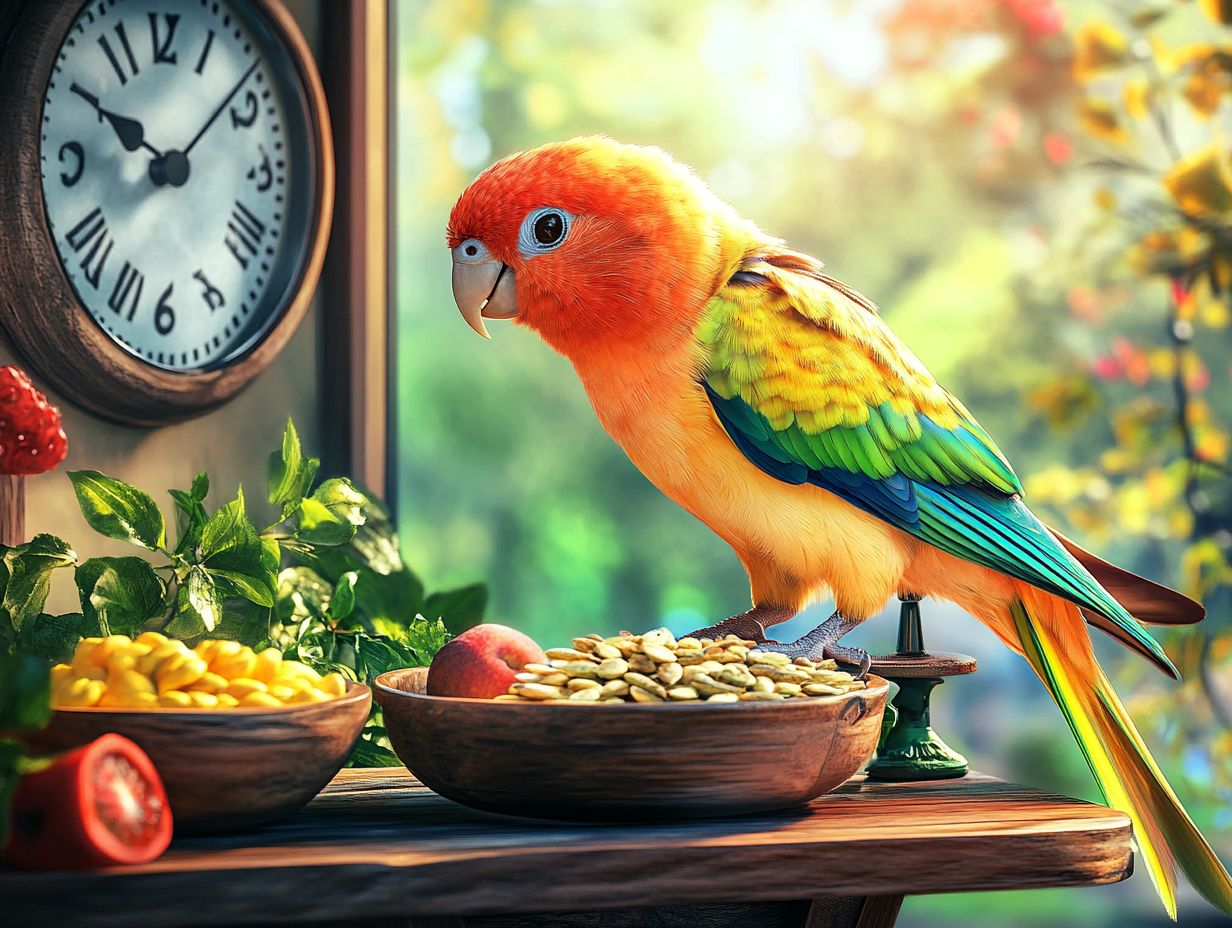
Establishing recommended feeding times for your pet birds, especially parrots, is essential for their overall health. Consistency in feeding times can greatly enhance their well-being.
It s advisable to implement a feeding schedule that includes morning, afternoon, and evening sessions with a variety of food options to provide balanced nutrition.
This approach ensures your feathered friends receive balanced nutrition throughout the day, promoting their well-being and vitality.
Morning, Afternoon, and Evening Feedings
Feeding schedules for parrots are typically structured into morning, afternoon, and evening sessions. Each one is pivotal for delivering a balanced diet that meets their nutritional needs, incorporating fruits, seeds, and pellets.
Recognizing the importance of these feeding times allows you to optimize your pet’s health and manage their weight effectively through careful portion control.
In the morning, offer a delightful mix of fresh fruits, such as grapes, and pellets with added nutrients. This jumpstarts their metabolism after an overnight fast, providing essential vitamins and minerals.
Afternoon meals can emphasize leafy greens and vegetables, which are crucial for hydration and fiber, promoting digestive health. Including treats like sunflower seeds can also encourage healthy eating habits.
As for the evening, don t forget to add a tasty serving of grains or legumes, along with small treats like peanuts. This ensures your parrots enjoy a nutritious and satisfying conclusion to their day.
By thoughtfully curating the composition of each meal, you can significantly enhance the overall well-being of your feathered companions.
Special Considerations for Sick or Elderly Birds
When caring for sick or elderly parrots, it s essential to take special considerations regarding their diet and feeding schedule. This ensures they receive the proper nutrition needed for recovery.
Ensure they re getting the nutrition they need daily to support a speedy recovery!
Adjusting Feeding Schedule for Optimal Health
Adjusting the feeding schedule for your parrot, particularly if it s ill or elderly, is crucial for ensuring optimal health and aiding recovery. Keeping a close eye on their food intake often requires a personalized approach to nutrition. This includes careful portion sizes.
Maintaining an appropriate feeding routine bolsters your bird’s physical health and significantly enhances its overall quality of life. This involves keenly observing your pet’s eating habits and making necessary adjustments to meal sizes, including treats and times. The goal is to provide adequate nutrition without overfeeding, as doing so could aggravate existing health concerns.
Neglecting proper nutrition can lead to a host of issues, including a weakened immune system and reduced energy levels, complicating recovery. Regular consultations with a veterinarian can help mitigate these risks. It s essential to consult with a qualified veterinarian, like Dr. Kemba Marshall, who can offer tailored guidance based on your parrot s specific health status and nutritional requirements.
A balanced diet is key to a happier, healthier bird!
Creating a Feeding Routine for Your Pet Bird
Establishing a feeding routine for your pet bird, especially parrots, is essential for consistent nutrition and promoting optimal health. A structured routine helps keep their environment clean and safe, allowing you to closely monitor their dietary habits, including water intake and favorite treats. This way, you can make necessary adjustments to ensure your feathered friend thrives.
Tips for Establishing a Consistent Schedule
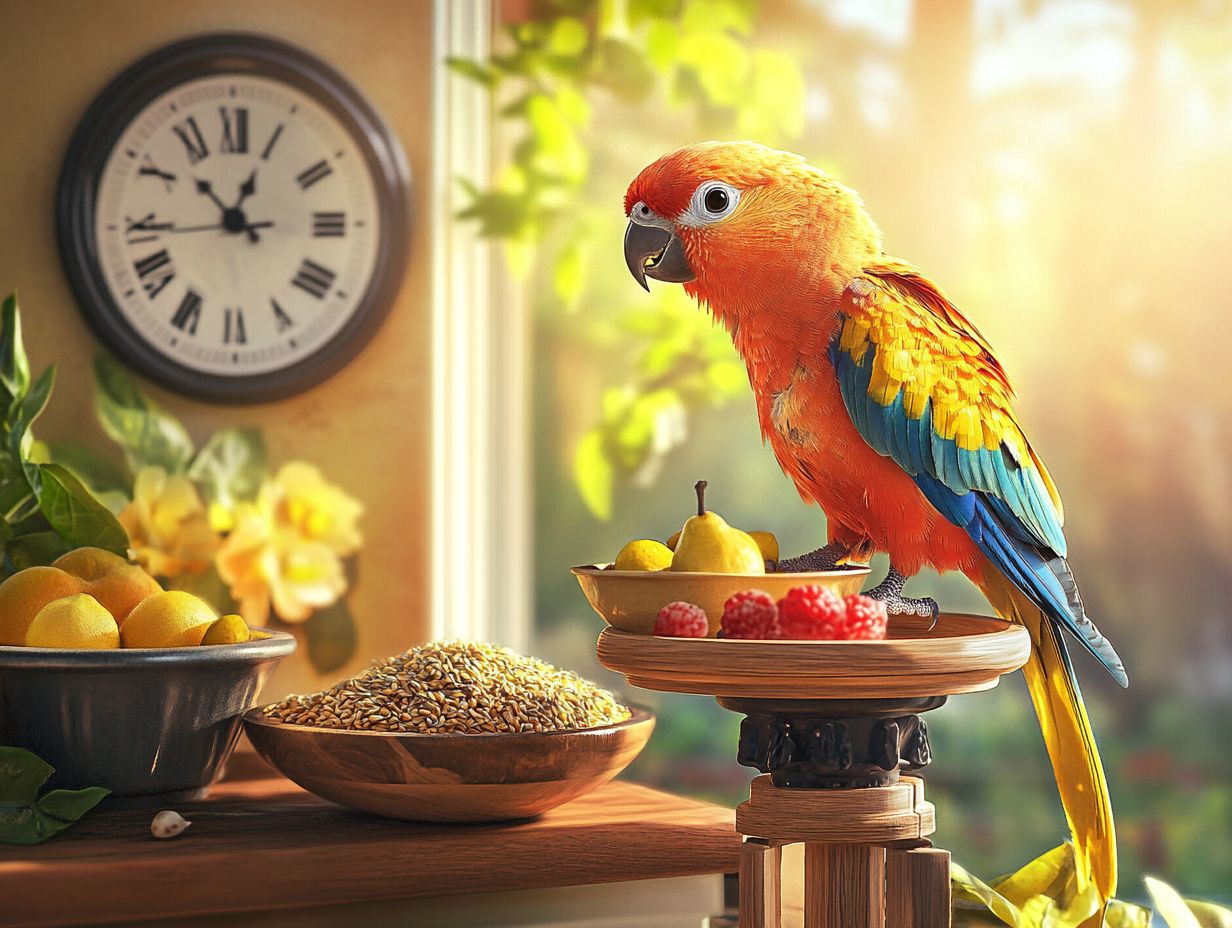
Establishing a consistent feeding schedule for your parrot greatly enhances their health and nutrition, providing stability in their daily routine. This stability is beneficial for their overall well-being.
By carefully monitoring their eating habits and adjusting portions based on their activity levels, including playtime and exercise, you can ensure your feathered friend receives the right amount of food at the right times. Pay attention to your bird’s preferences; subtle behavior changes can reveal their dietary needs. If your parrot shows less interest in a certain food, it might be time to introduce some variety or adjust their nutrient intake to ensure they receive a mix of vitamins and minerals.
Maintaining this routine boosts their physical well-being and nurtures their emotional health. This strengthens the bond between you and your beloved companion, making them more responsive during training sessions.
Signs that Your Pet Bird May Need More or Less Food
Recognizing the signs that your pet parrot may require more or less food is essential for effectively managing their health and diet, especially during seasonal changes or health fluctuations. Subtle changes in behavior or weight can indicate potential nutritional imbalances, prompting you to adjust their feeding regimen accordingly. Consult a veterinarian if necessary.
Take action now to ensure your bird s health! Start adjusting your parrot’s feeding routine today for a happier, healthier life!
Monitoring Your Bird’s Behavior and Weight
Monitoring your parrot’s behavior and weight regularly is crucial for understanding their dietary needs and prioritizing their health. This allows for timely interventions when necessary.
To accomplish this, consider employing a combination of daily observations and a consistent weighing schedule. This will help you track changes in their weight and ensure they are not becoming overweight or underweight.
Noticing changes in activity levels, vocalizations, and feather condition can offer valuable insights into your parrot’s overall wellness. These indicators may suggest if their diet needs adjustment.
Tracking weight with a reliable scale, ideally at the same time each day, enables you to spot trends that might indicate dietary imbalances or underlying health issues that may need addressing with your veterinarian.
Keeping a food diary can help you see connections between what your parrot eats and changes in their weight and energy levels. Taking charge of your parrot s care means you can feel confident about their health!
Frequently Asked Questions
What is the best time to feed my pet bird?
The best time to feed your pet bird is in the morning, shortly after they wake up. This is when birds are most active and hungry, making it an ideal time to establish a feeding schedule.
How many times a day should I feed my pet bird?
Feed your pet bird 2 times a day: once in the morning and once in the evening. This mimics their natural feeding patterns in the wild, ensuring they receive the right mix of food and training.
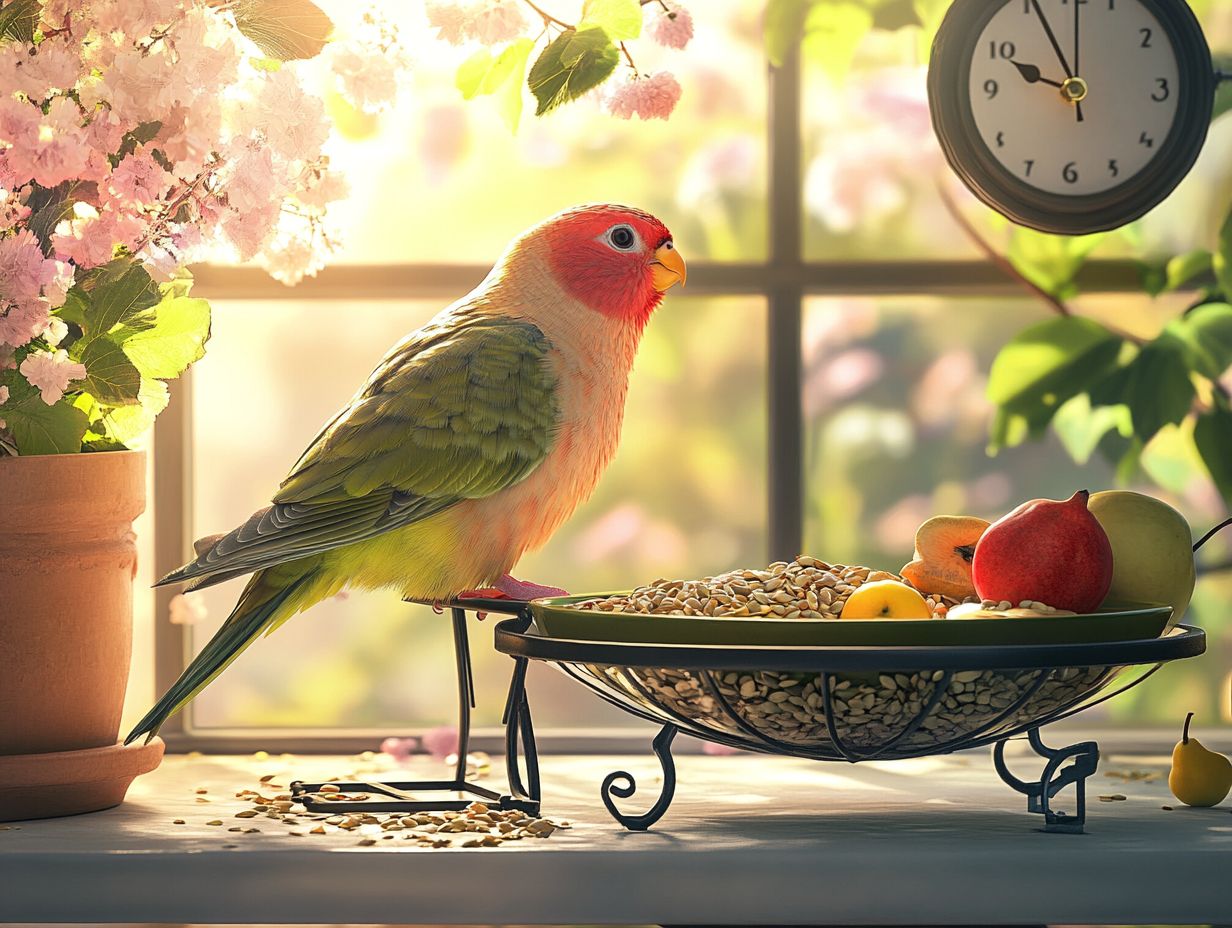
Can I leave food out for my pet bird all day?
No, it is not recommended to leave food out for your pet bird all day. This can lead to overeating and obesity, which poses health risks and can attract pests and bacteria.
Should I feed my pet bird before or after playtime?
It is best to feed your pet bird after playtime. This allows them to work up an appetite for their daily feeding and ensures they are not too full to engage in play and exercise.
What type of food is best for my pet bird?
The best diet for your bird includes pellets, seeds, and fresh fruits and veggies. Including nuts and occasional treats can be beneficial. Consult with your veterinarian for specific recommendations based on your bird’s species and needs.
Is it okay to give my pet bird treats?
Yes, treats can be part of your pet bird’s diet, but they should not make up a significant portion. Choose healthy options like small amounts of fruits, veggies, or seeds, including peanuts and sunflower seeds.

